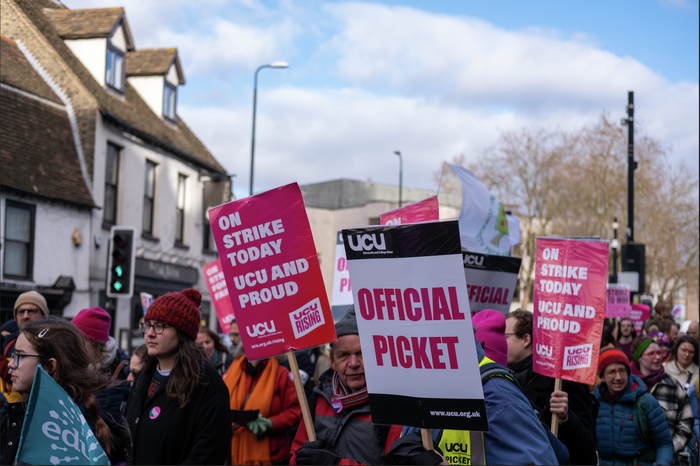Language students slam faculty for ‘neglectful’ exam changes
More than 80 students have signed an open letter following a faculty decision to introduce 3-hour timed exams

More than eighty language and linguistics students have described exam format changes as “neglectful” in an open letter sent last Friday.
The open letter has been signed by students across the Modern and Medieval Language and Linguistics (MMLL) faculty, all of whom will face these exam changes in their fourth and final year.
The final exams, which are worth 83% of this cohort’s final mark, were expected to be carried out in a ‘tranche’ format, with students sitting take-home assessments over the course of several days.
Instead, the proposed changes include a three-hour time restriction, an exam format this cohort have never experienced before. This format, say students, prioritises “rote memorisation” over “genuine understanding and analysis.”
An MMLL faculty spokesperson told Varsity that the “tranche-based take-home assessment system was introduced as an emergency response to the pandemic.”
“During 2022-23,” the spokesperson continued, “the Faculty’s Undergraduate Studies Committee undertook extensive consultations of its staff and students, including consideration of the results of student surveys, a series of open hybrid meetings to which all staff and students were invited, and focus groups. Working groups, including student representatives, reported back to a USC meeting in May 2023, which unanimously supported recommendations to alter the take-home format for 2023-24.”
The letter’s signatories believe, however, that this consultation process did not fairly include student voices. The letter points out that the most affected cohort, those now entering their final year, were on their year abroad when meetings were held. Due to technical issues with Zoom and varying time zones, cooperation between staff and students is referred to in the letter as having been “unfeasible.”
“The consultation process was limited and failed to accommodate the diverse needs of our international cohort,” the letter stated.
The letter also states that “the cohort [was] overwhelmingly in favour” of leaving the exam format unchanged, even before these consultations.
Luke Shears, MMLL Student Representative, told Varsity that “the vast majority of finalists are opposed to the changes”.
The letter goes on to cite external factors such as the COVID-19 pandemic, teaching strikes, and the upcoming supervision boycott, saying that the additional impact of the exam changes would be “detrimental” to students’ “academic performance and overall well-being”.
91% of students are either “fairly dissatisfied” or “very dissatisfied” with the proposed exam changes, according to a survey conducted by the Year Abroad Student Representatives and cited in the letter.
The results of the survey also show that 94% of students do not believe that the MMLL faculty had “provided them with sufficient opportunities to provide feedback” on the exam changes.
The faculty should completely retract the proposal for current students, and “gradually introduce” the new format for incoming cohorts, the letter concludes.
The letter finished: “In conclusion, we appeal for a reconsideration of these decisions, prioritising an approach that values our years of preparation and respects our feedback. We anticipate an open dialogue to address these concerns more collaboratively.”
The introduction of the new exam format follows the cancellation of MML and HML oral exams in April, due to the ongoing UCU Marking and Assessment Boycott.
The faculty spokesperson also told Varsity: “The coursework-based format has been updated to a hybrid one, consisting of an element of untimed coursework for each scheduled paper, plus (usually) two open-book essays written in a 3-hour online window. This compares favourably to the now widespread practice in the University of requesting three essays in a 5-hour window.”
“Nevertheless, we take our students’ concerns seriously and shall respond to the open letter in due course. The Faculty is committed to a diverse examination ecosystem, with a high proportion of coursework (including dissertations) mixed in with timed assessments,” the spokesperson concluded.
 News / Uni Scout and Guide Club affirms trans inclusion 12 December 2025
News / Uni Scout and Guide Club affirms trans inclusion 12 December 2025 News / Cambridge Vet School gets lifeline year to stay accredited28 November 2025
News / Cambridge Vet School gets lifeline year to stay accredited28 November 2025 News / Cambridge study finds students learn better with notes than AI13 December 2025
News / Cambridge study finds students learn better with notes than AI13 December 2025 Science / Did your ex trip on King’s Parade? The science behind the ‘ick’12 December 2025
Science / Did your ex trip on King’s Parade? The science behind the ‘ick’12 December 2025 News / Pembroke to convert listed office building into accom9 December 2025
News / Pembroke to convert listed office building into accom9 December 2025








